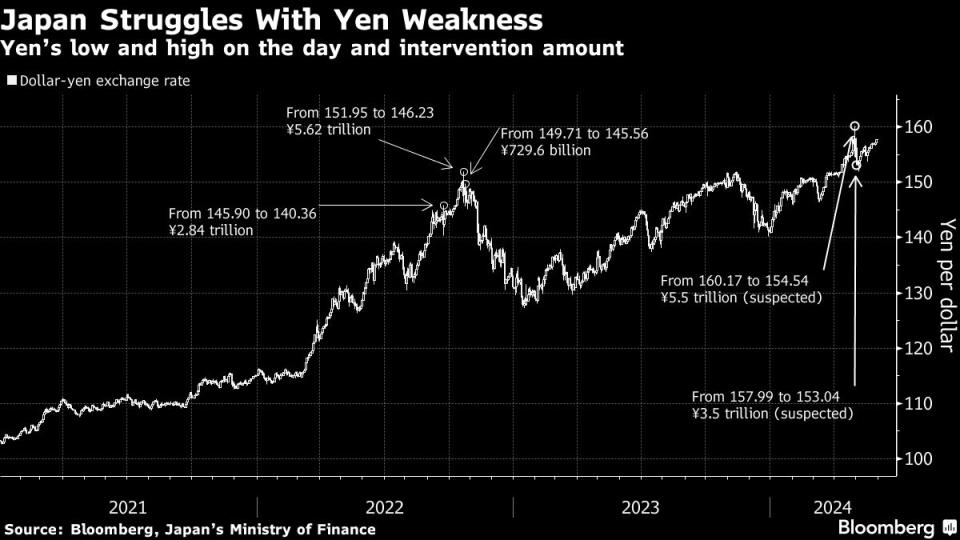Yen Rebounds After Weakening to Level of Suspected Intervention

(Bloomberg) -- The yen rebounded after falling through a level that prompted the latest round of suspected action by Japan to prop up the currency.
Most Read from Bloomberg
World’s Largest Nuclear Plant Sits Idle While Energy Needs Soar
‘Not Gonna Be Pretty:’ Covid-Era Homebuyers Face Huge Rate Jump
Warning Signals Are Flashing for Homeowners in Texas and Florida
Insurers Sink as UnitedHealth Sees ‘Disturbance’ in Medicaid
American Air Fired Commercial Head After Sales Strategy Alienated Corporate Clients
The yen gained 0.4% to 157 against the dollar as of 5 p.m. in Tokyo after dropping to a four-week low of 157.71 late Wednesday. Its move past the closely watched mark of 157.52 underscored the limited impact of intervention.
The sustained weakness reflects the wide gap in yields between Japan and other major economies which has pulled money out of the yen into assets with potentially higher returns. Even as Japanese bond yields reach fresh decade highs, pressure on the country’s currency hasn’t abated.
“The yen carry trade remains too attractive and fast-money investors continue to short yen,” said Shoki Omori, chief desk strategist at Mizuho Securities Co. “Unless speculation emerges that the Federal Reserve will cut rates big or the Bank of Japan will raise rates a lot, strong momentum in dollar-yen is unlikely to change.”
Japan’s 10-year government bond yield increased as much as 2.5 basis points to 1.1%, the highest since July 2011. Benchmark yields have been rising on mounting speculation the BOJ will deliver additional interest-rate hikes this year after exiting the world’s last sub-zero rate regime in March.
“Even if Japan’s yields go slightly higher, it does not matter,” Omori said, with the market focus still on higher-yielding currencies.
The yen has depreciated not just against the dollar, but also versus European currencies. It’s near the lowest since 2008 against the pound and is approaching a record low against the euro. Ten-year US and UK bonds yield over 300 basis points more than their Japanese counterparts.
Intervention Pushback
Japanese authorities haven’t confirmed whether they bought yen in late April and early this month. They may have purchased about ¥3.5 trillion ($22 billion) of the currency, based on a comparison of commercial lenders’ deposits at the Bank of Japan with brokers’ forecasts.
Finance Minister Shunichi Suzuki has said repeatedly that he’s closely watching developments in the currency market and will take appropriate measures if necessary. Still, the rate of change in the yen has been less rapid than a month ago, and Japan needs to be mindful of any pushback from its trading partners.
In a sign that it may be harder for Japan to step into the market now, US Treasury Secretary Janet Yellen reiterated that currency intervention should be a seldom-used tool and that officials ought to give fair warning about when they resort to it. Group of Seven nations have agreed not to tinker with exchange rates unless they are tamping down extreme volatility, she said earlier this month.
“It may be hard for them to step in when the pace of the yen’s weakness is slow given recent remarks from Yellen,” said Marito Ueda, head of the market research department at SBI Liquidity Market Co. “Currencies with higher yields are likely to strengthen amid a surge in yields globally, continuing to weigh on the yen.”
Read more: Yen Showdown Looms as Traders ‘Obsessed’ With Carry Ramp Up Bets
BOJ Board Member Seiji Adachi, a noted dove on the board, acknowledged on Wednesday that it’s possible yen weakness could spur price gains and prompt authorities to consider another rate hike earlier than expected. Adachi’s remarks are largely in line with those of Governor Kazuo Ueda, who has recently shifted his tone regarding the weak yen by warning clearly of the potential for policy action in response to the currency’s impact on prices.
Swap markets are pricing in an almost 100% chance of a rate hike by the BOJ’s July meeting, compared with a 75% probability at the beginning of the month.
--With assistance from Masaki Kondo.
(Updates prices in second paragraph.)
Most Read from Bloomberg Businessweek
Why Dave & Buster’s Is Transforming Its Arcades Into Casinos
Disney Is Banking On Sequels to Help Get Pixar Back on Track
The Secret Ozempic Recipe Behind Novo's Race to Boost Supplies
©2024 Bloomberg L.P.

 Yahoo Finance
Yahoo Finance 